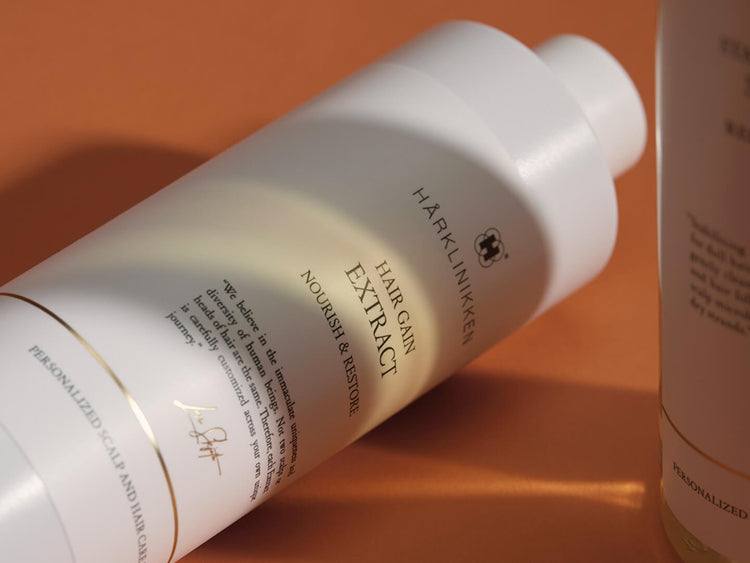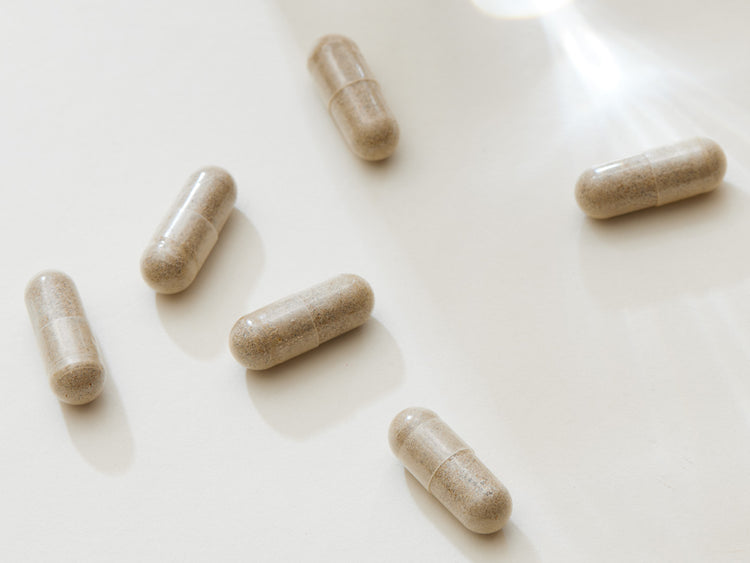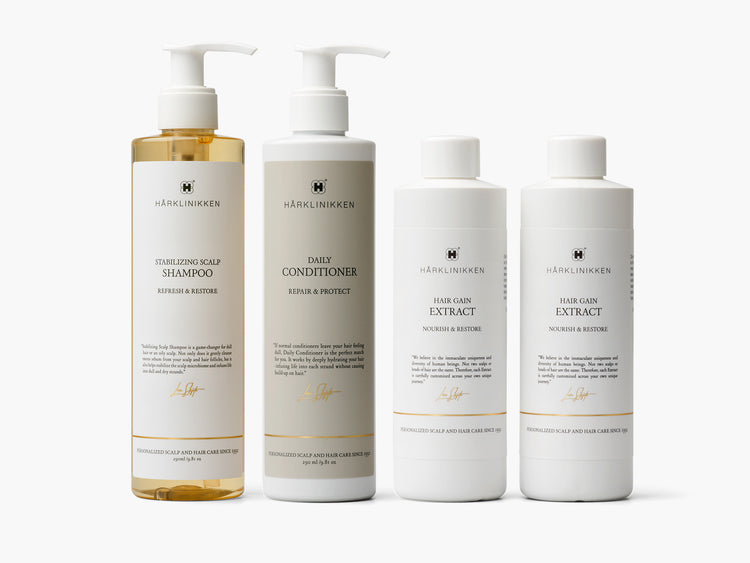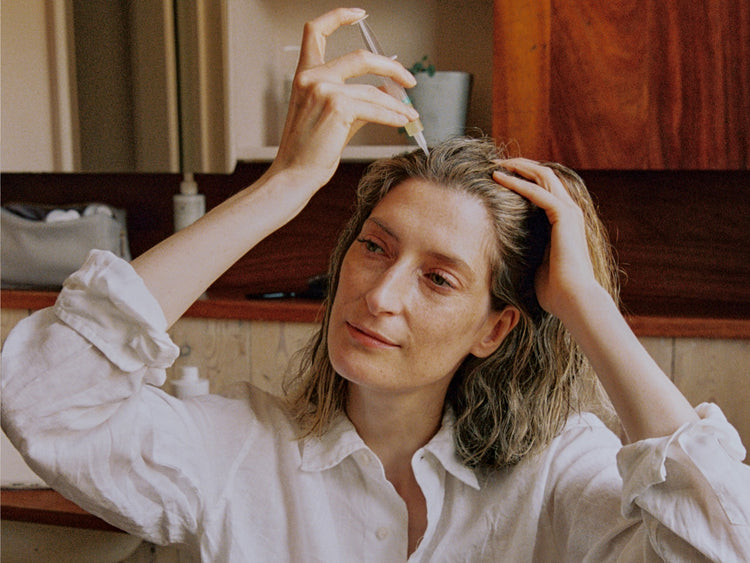There are two crucial things to understand about dry shampoo. First, it isn’t shampoo at all. Second, there’s no replacement for washing your hair with shampoo and water. Using dry shampoo can cause a plethora of issues, not only due to the problematic ingredients used in their formulas, but also because it often leads people to cleanse their scalp and hair less frequently. At Hårklinikken, we don’t make so-called dry shampoo and don’t recommend using it. If you’re curious why, Hårklinikken founder and lead researcher, Lars Skjøth, explains the reasons to avoid this type of product and clarifies what dry shampoo really is.
What exactly is dry shampoo?
Usually made of a fine powder, dry shampoo is a product made to absorb excess oil from the scalp and hair. It’s marketed as a quick fix to use between washes. It comes as powder, mist, foam or even paste, but very popular in an aerosol spray, where it’s released with great pressure as a very fine mist and applied to the roots of the hair, then brushed out. “It shouldn't be called dry shampoo,” Skjøth explains. “That's misleading, it’s incorrect. Dry shampoo has nothing to do with shampoo, it’s really more of a styling product.”
What ingredients is dry shampoo made with?
The powder can contain many different ingredients like starch, talc, silica, clay, charcoal, baking soda, alcohol and perfume – ingredients that can potentially have negative effects on your scalp and hair follicles.
Starch
Starch-based products can make the hair feel heavy and greasy. This can lead to the accumulation of product residue on the scalp and hair, potentially clogging hair follicles. When follicles are clogged, it can hinder the growth of new hair. Moreover, excess starch can create an environment where bacteria and yeast on the scalp thrive, potentially leading to scalp issues such as itching, irritation and dandruff.
Talc and Charcoal
Often used in dry shampoos to absorb excess oil from the scalp. However, talc and charcoal can be problematic as it can build up on the scalp and hair, clogging hair follicles and causing irritation.
Silica
Silica is a fine substance sometimes used in hair products as a thickening or abrasive agent. It can irritate the scalp and lead to inflammation, itching and flaking.
Baking Soda
Baking soda is alkaline and can disrupt the natural pH balance of your scalp, making it too alkaline. The scalp's natural pH is slightly acidic, which is essential for the health of your scalp and hair. Using baking soda can strip your hair and scalp of their natural oils, leading to dryness, breakage and scalp irritation. An imbalanced pH can also create an environment where harmful bacteria and fungi thrive, potentially causing scalp issues.
Alcohol and Fragrance
Both alcohol and fragrance can cause irritation to the scalp as well as contact dermatitis.
What damage does dry shampoo do to hair and scalp?
Dry shampoos can contribute to or worsen scalp issues, especially if used as an alternative to cleansing. The chemicals and powders can clog hair follicles and throw off your scalp’s pH balance. “Dry shampoo actually helps to build bacterial and fungal colonies on your scalp,” Skjøth explains. When dry shampoo attaches to sebum and dead skin cells, the fungus and bacteria within those cells thrive. “When dry shampoo attaches to the scalp itself, it can cause contact reactions that can lead to inflammation, which can lead to follicle infection and then scarring.”
But it’s not only scalp problems that can be caused by this type of product, it’s also damaging to the hair itself. "Dry shampoo can dehydrate hair,” he says. “When you have certain materials sitting on the strands that are close to your scalp – that new, fresh hair – you’re drying them out right away.”
Are there dry shampoos that are better than others?
While some dry shampoos have fewer potentially harmful ingredients, they are all best avoided. Many dry shampoos also use an aerosol spray to disperse the product, which are also problematic for the environment, "So we should just stay away from all of them in general,” Skjøth says.
Can some hair types use dry shampoo?
People with all hair and scalp types should avoid using dry shampoo. “But if you do decide to use dry shampoo, I suggest that you wash it out as soon as possible,” he says. “And be mindful that if you experience irritation briefly after you apply it, that could be because you’re getting a contact reaction.” Keep in mind it can take several washes to entirely remove the product from your scalp.
What should I use in place of dry shampoo?
The first step to optimal scalp and hair health is a regular cleansing routine. For most people, we recommend washing daily or at least a few times per week. But it’s essential to use the right kind of shampoo – a mild but effective cleanser that’s free from parabens, silicones, waxes, dyes and perfumes – and use the best right method for cleansing.
Our Stabilizing Scalp Shampoo and Balancing Shampoo are both formulated as a treatment to create optimal conditions for scalp health and hair growth.
Many people use dry shampoo to make their hair feel or look thicker and to give hair more body. The reason they have this need is often because they have less hair than they used to have and dry shampoo is used to compensate for this fact. With our Hair Gain Extract, which is customised to each client’s individual needs, we can help most people improve their hair quality, density, volume and lustre. Most of our clients no longer feel the need for the dry shampoo after being on the Hårklinikken Method for a few weeks to two/three months.
Why doesn't Hårklinikken make dry shampoo?
Strong, healthy hair begins with the scalp. For more than 30 years, Hårklinikken’s been dedicated to a scalp-first approach. We focus on optimising conditions for the scalp and hair follicles for maximum growth. Many products on the market are designed to make the hair look good – even if they may negatively impact the scalp, hair follicles and hair. They do so by altering the ideal biological environment and can cause serious issues with ingredients that shouldn’t be in contact with the scalp or hair. Using products like this means potentially clogging or damaging your hair follicles and disrupting your scalp’s microbiome, which can lead to irritation, inflammation and – ultimately – hair thinning. At Hårklinikken, we only use ingredients that have been proven to work in synergy to foster the ideal scalp and hair follicle ecosystem. “We leave out ingredients that, in conjunction with other constituents, can cause reactions to the scalp or hair,” Skjøth says. “We are creating health, which is a balanced scalp microbiome and hair that has shine, lustre, and fullness."

Unsure where to start?
We only accept candidates who we believe we can help, which is why our online Hair Assessment is the best place to start. Based on your results, you will either qualify for immediate treatment or we will organize a consultation.






